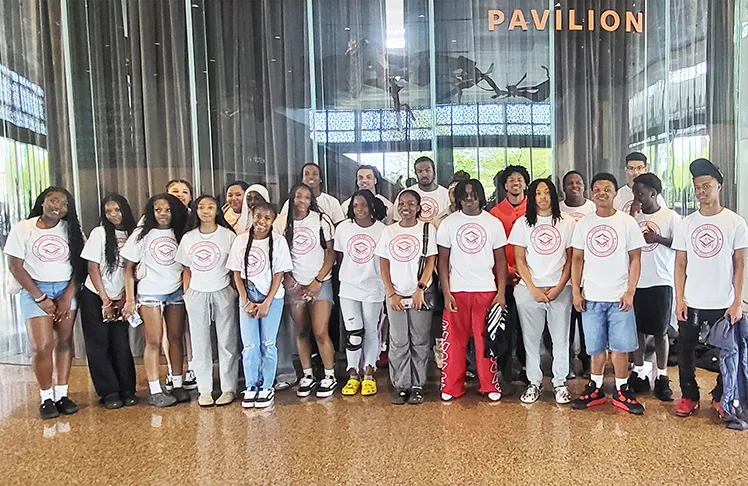By Aaron Allen
In an effort to broaden horizons and inspire futures, community organizations in Seattle are introducing young Black students to the legacy and opportunities of Historically Black Colleges and Universities (HBCUs). Through initiatives like the BE Project and Baseball Beyond Borders, students who may never have otherwise traveled outside the city are now experiencing firsthand the history, culture, and academic excellence of HBCUs.
Black college tours are on the rise as leaders work to expose youth to educational pathways often overlooked. Organizations such as the BE Project and Baseball Beyond Borders, which centers on student athletes, are taking young people across the country to visit campuses, explore academic programs, and learn about the deep historical impact of Black colleges and universities.
Today, the nation’s 106 HBCUs account for just 3% of all American colleges and universities, yet they produce nearly 20% of all African American graduates and 25% of Black graduates in the STEM fields—critical industries for the future.
The BE Project was launched by Executive Director Allen Brooks at the height of the COVID-19 pandemic, a time when young people, particularly in Seattle’s Black communities, faced increasing violence and instability.
“The reasoning behind starting this nonprofit was there was a lot of things going on in the city of Seattle and outlying areas as far as high school students, especially during and after COVID. With shootings, the CD and Southend beefs, and just a lot of silliness,” Brooks said. “The idea came because I wanted these young people to see that outside of Seattle there’s a lot of positive things going on.”
Brooks said it was critical for students to experience environments where Black excellence is celebrated.
“At that time, I felt like it was necessary for them to see what young Black excellence looked like—educated young Black kids trying to get away from all of that kind of silliness and meet at a place with like-minded people,” he said.
During the pandemic, many young Black students lost critical support systems, Brooks explained. The BE Project aimed to fill that gap, offering students a new direction and a glimpse of possibility beyond the violence and limitations of their immediate surroundings.
Baseball Beyond Borders, led by Bookie Gates, shares a similar vision, but adds an athletic component. Gates’ program emphasizes that predominantly white institutions are not the only pathway for student athletes; HBCUs can offer competitive academic and athletic opportunities.
“Our work through HBCUs is really our ability to open up pathways and doors for student athletes to explore HBCUs through the way of baseball and softball programming,” Gates said. “One of our core programs is what we call our reconciliation tour. It’s an annual tour in Jackson, Mississippi, and Montgomery, Alabama, where we take student athletes and coaches to engage HBCUs, particularly Jackson State University, to run baseball and softball camps. Then we go into Montgomery to the Equal Justice Initiative Museum and Memorial to learn about racial history and trauma.”
Expanding a young person’s worldview can be daunting, but for students like Phoenyx Pierce and Jayde Brooks, both of Garfield High School, the experience was transformative.
“The experience, it was great, like getting to see colleges where the main population of people look like me was amazing,” said Pierce, a junior. “The sense of community and family that the students showed us and what it would look like if we went there—it helped because one of the schools we visited was one I hadn’t really considered. Seeing it in person really helped me decide that I want to apply now.”
Jayde Brooks, a sophomore, said she initially felt nervous but quickly found her place.
“Well, going on a college tour, I was nervous at first because this was my first year going. But when I got there and met everybody, I felt really comfortable,” she said. “Then viewing the schools just felt really good because you get to see something outside of Washington. You get to really picture yourself being somewhere else, not just staying in Washington.”
Seeing campuses where Black students are the majority was a powerful experience for both.
“I definitely did see the difference,” Jayde Brooks said. “Because going to, for example, Garfield, you see people that look like you, but you don’t see a lot of people that look like you. So going out of state and doing college tours, it felt comfortable because I saw more people that look like me.”
Learning the history of African Americans, and supporting educational systems that are under political and financial pressure today, resonated deeply with both students and leaders. Exposure to HBCUs reminded them why these institutions’ survival and purpose remain a top priority for the Black community.
According to the United Negro College Fund (UNCF), HBCUs provide a uniquely supportive environment. A Gallup-Purdue poll reports that African American graduates of HBCUs are more likely to have felt supported during college and to thrive afterward compared to Black graduates of predominantly white institutions. Forty percent of HBCU students report feeling financially secure during college, compared to just 29% of Black students at other schools.
Brooks said the current political climate makes exposure to HBCUs even more urgent.
“We get them into our programs to help show these kids what it looks like to be in an environment with people that look like them,” Brooks said. “I think that’s where the BE Project comes in. It is important that these kids understand that with this administration running the country right now, there’s getting ready to be a big exclusion of our people.”
He said efforts to erase Black history highlight why programs like his are vital.
“We can pretend like everything is OK, but anytime somebody is trying to erase your history and downplay it—and doing the things that this administration is trying to do—it is even more important that we get these kids out here so they will never be able to be cheated and push them to their greatness,” Brooks said.

